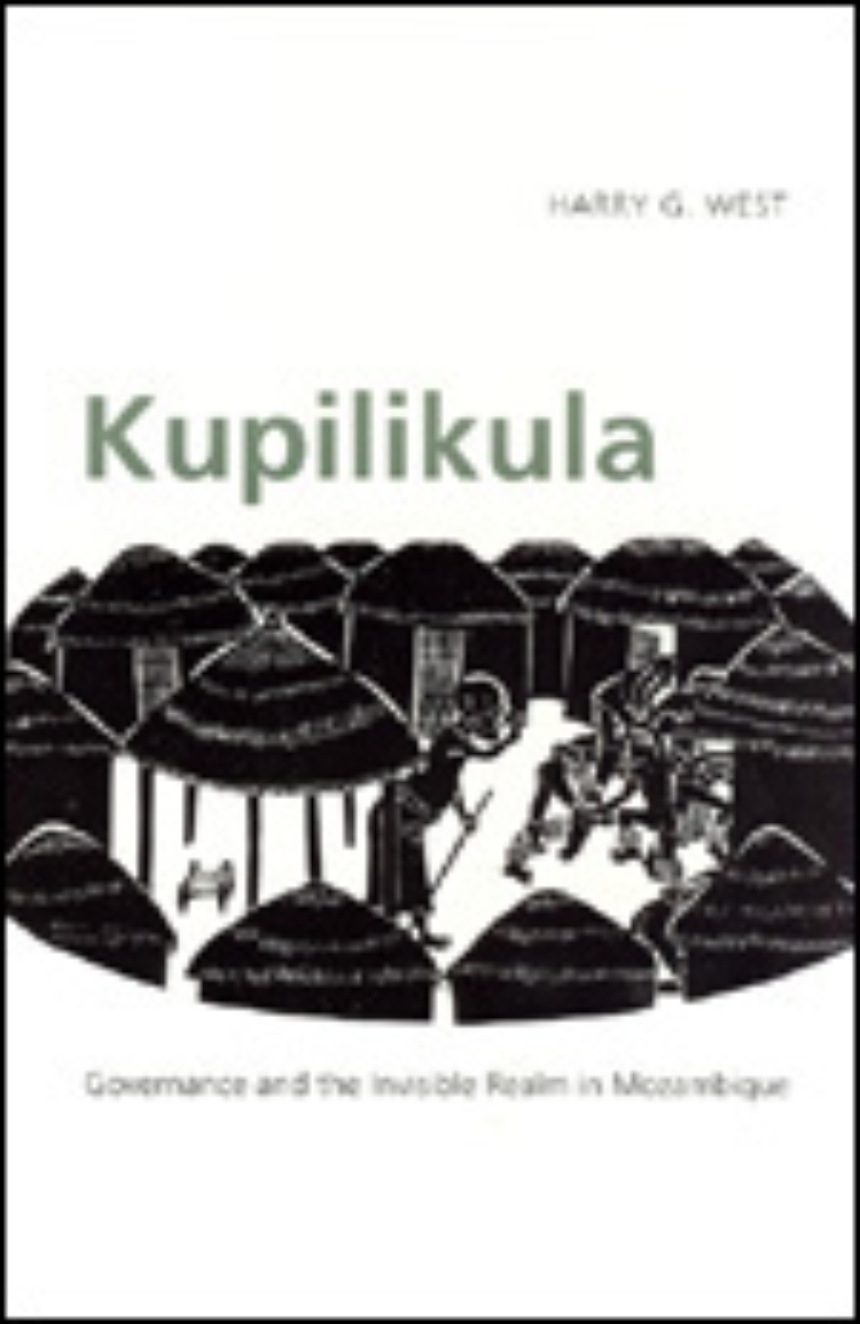Kupilikula
Governance and the Invisible Realm in Mozambique
On the Mueda plateau in northern Mozambique, sorcerers are said to feed on their victims, sometimes "making" lions or transforming into lions to literally devour their flesh. When the ruling FRELIMO party subscribed to socialism, it condemned sorcery beliefs and counter-sorcery practices as false consciousness, but since undertaking neoliberal reform, the party—still in power after three electoral cycles—has "tolerated tradition," leaving villagers to interpret and engage with events in the idiom of sorcery. Now, when the lions prowl plateau villages ,suspected sorcerers are often lynched.
In this historical ethnography of sorcery, Harry G. West draws on a decade of fieldwork and combines the perspectives of anthropology and political science to reveal how Muedans expect responsible authorities to monitor the invisible realm of sorcery and to overturn or, as Muedans call it, "kupilikula" sorcerers’ destructive attacks by practicing a constructive form of counter-sorcery themselves. Kupilikula argues that, where neoliberal policies have fostered social division rather than security and prosperity, Muedans have, in fact, used sorcery discourse to assess and sometimes overturn reforms, advancing alternative visions of a world transformed.
In this historical ethnography of sorcery, Harry G. West draws on a decade of fieldwork and combines the perspectives of anthropology and political science to reveal how Muedans expect responsible authorities to monitor the invisible realm of sorcery and to overturn or, as Muedans call it, "kupilikula" sorcerers’ destructive attacks by practicing a constructive form of counter-sorcery themselves. Kupilikula argues that, where neoliberal policies have fostered social division rather than security and prosperity, Muedans have, in fact, used sorcery discourse to assess and sometimes overturn reforms, advancing alternative visions of a world transformed.
336 pages | 31 halftones, 5 maps | 6 x 9 | © 2005
Anthropology: Cultural and Social Anthropology
History: African History
Reviews
Table of Contents
Acknowledgments
Prologue: Immaterial Evidence
Introduction
Part One
1. The Settlement of the Mueda Plateau and the Making of Makonde
2. Provocation and Authority, Schism and Solidarity
3. Meat, Power, and the Feeding of Appetites
4. The Invisible Realm
5. Healing Visions
6. Victims or Perpetrators?
7. Complicated Careers
8. Sorcery of Construction
Part Two
9. Imagined Conquerors
10. Consuming Labor and Its Products
11. Christianity and Makonde Tradition
12. Conversation and Conversion
13. Christians, Pagans, and Sorcery
14. Night People
15. Deadly Games of Hide-and-Seek
16. Revolution, Science, and Sorcery
17. Rewriting the Landscape
18. The Villagization of Sorcery
19. Self-Defense and Self-Enrichment
Part Three
20. The "Resurgence of Tradition"
21. Neoliberal Reform and Mozambican Tradition
22. Limited Recognition
23. Transcending Traditions
24. Uncertain Knowledge
25. Postwar Uncivil Society
26. Democratization and/of the Use of Force
27. Governing in the Twilight
28. Constitutional Reform and Perpetual Suspicion
Epilogue: Lines of Succession
Glossary
Notes
References
Index
Prologue: Immaterial Evidence
Introduction
Part One
1. The Settlement of the Mueda Plateau and the Making of Makonde
2. Provocation and Authority, Schism and Solidarity
3. Meat, Power, and the Feeding of Appetites
4. The Invisible Realm
5. Healing Visions
6. Victims or Perpetrators?
7. Complicated Careers
8. Sorcery of Construction
Part Two
9. Imagined Conquerors
10. Consuming Labor and Its Products
11. Christianity and Makonde Tradition
12. Conversation and Conversion
13. Christians, Pagans, and Sorcery
14. Night People
15. Deadly Games of Hide-and-Seek
16. Revolution, Science, and Sorcery
17. Rewriting the Landscape
18. The Villagization of Sorcery
19. Self-Defense and Self-Enrichment
Part Three
20. The "Resurgence of Tradition"
21. Neoliberal Reform and Mozambican Tradition
22. Limited Recognition
23. Transcending Traditions
24. Uncertain Knowledge
25. Postwar Uncivil Society
26. Democratization and/of the Use of Force
27. Governing in the Twilight
28. Constitutional Reform and Perpetual Suspicion
Epilogue: Lines of Succession
Glossary
Notes
References
Index
Awards
Royal Anthropological Institute: Amaury Talbot Prize
Won
African Studies Association: Melville J. Herskovits Award
Honorable Mention
